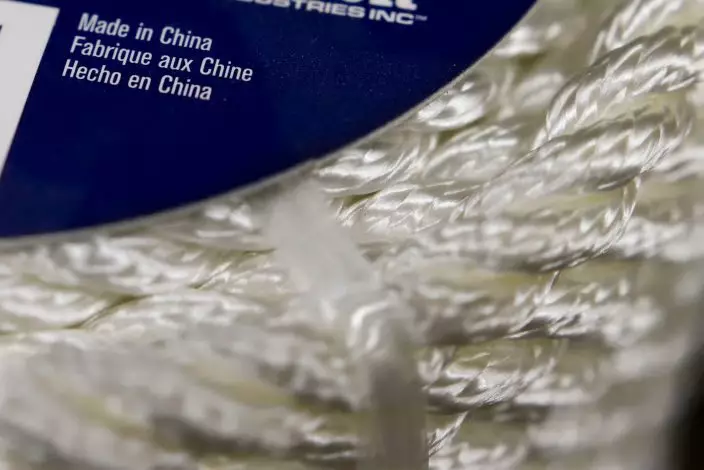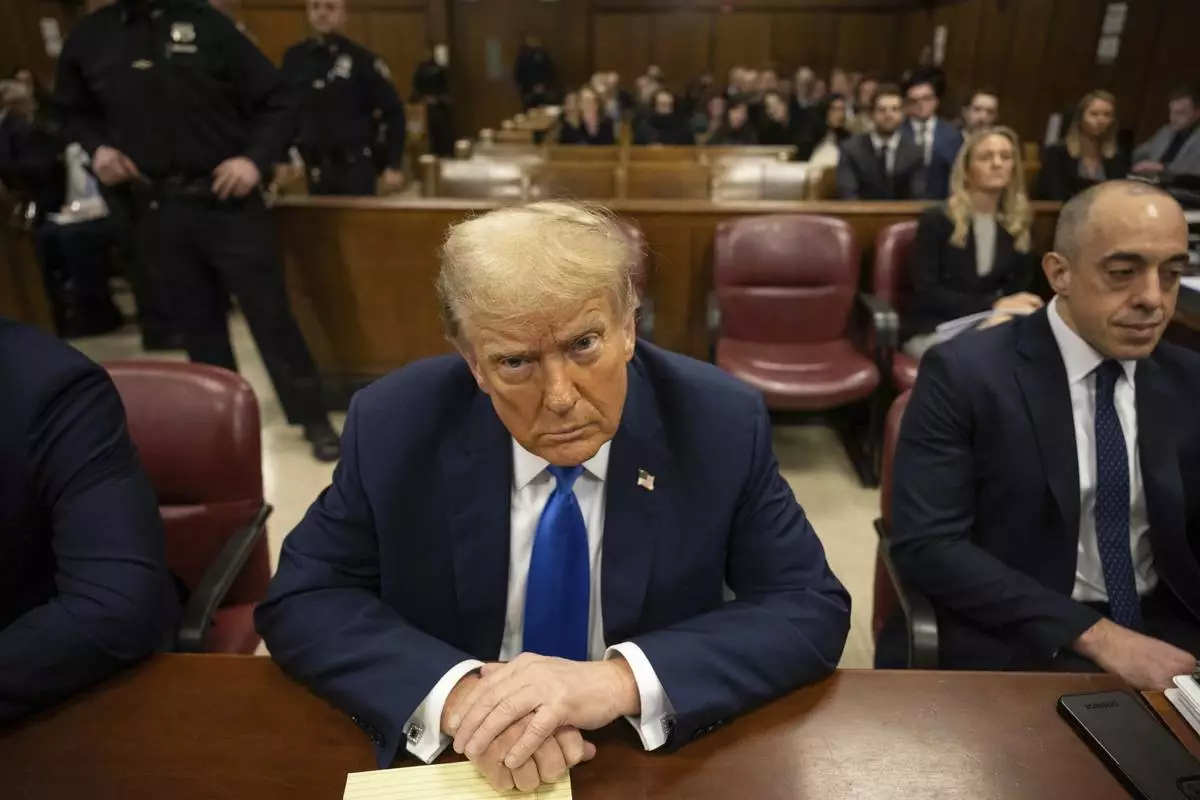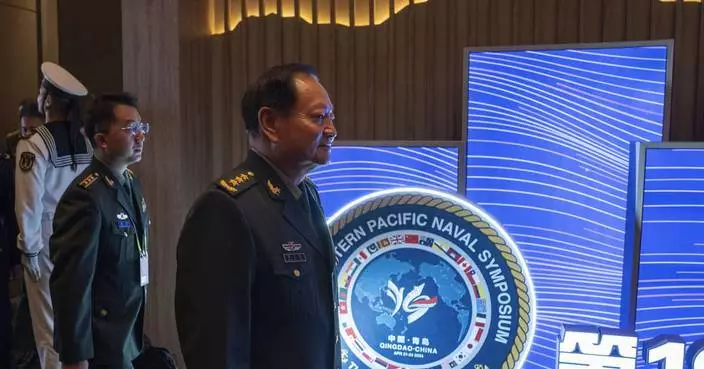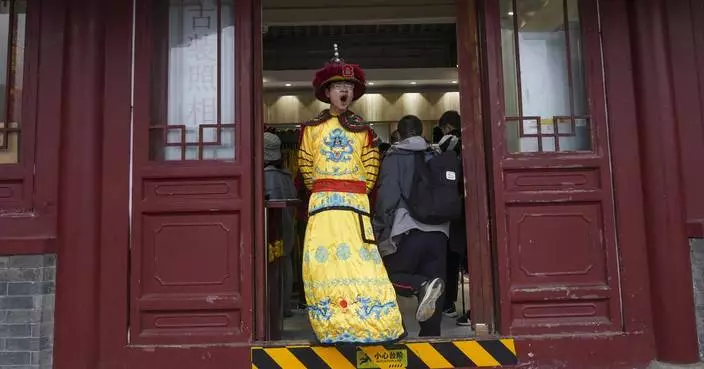Some are moving factories out of China. Others are strategically redesigning products. Some are seeking loopholes in trade law or even mislabeling where their goods originate — all with the goal of evading President Donald Trump's sweeping tariffs on goods from China.
But most of the companies that stand to be hurt by Trump's tariffs are hunkering down and waiting — waiting because they don't know when, whether or how his yearlong trade war with China will end or which other countries the president might target next.
Consider Xcel Brands, a New York-based company that owns such brands as Halston, Isaac Mizrahi and C. Wonder. Two years ago, it made all its clothing in China. Now it's on the move — diversifying production to Vietnam, Cambodia, Bangladesh and Canada and considering Mexico and Central America as well. By next year, it expects to have left China completely.

FILE - In this May 9, 2019, file photo synthetic rope, with labeling indicating it was made in China, is displayed in a store in Cranberry Township, Pa. Faced with the prospect of a forever war with America’s trading partners, numerous businesses say they’re delaying investment decisions and reviewing their business relationships until they have a clearer view of how President Donald Trump’s trade wars might end. (AP PhotoKeith Srakocic, File)
"You have to keep moving things around," said CEO Robert D'Loren.
Trump launched the world's biggest trade war since the 1930s by imposing tariffs on $250 billion in Chinese goods and threatening to tax $300 billion more. He has pursued separate battles with America's allies, too — from South Korea, Mexico and Canada to Japan and the European Union — over trade in steel, aluminum and autos.
"The president has managed to pick a fight with all of our trading partners," said Rick Helfenbein, CEO of the American Apparel & Footwear Association trade group.
Faced with the prospect of a forever war with America's trading partners, numerous businesses say they're delaying investment decisions and reviewing their business relationships until they have a clearer view of how Trump's trade wars might end — if they will.
The paralysis itself is inflicting its own damage worldwide. Foreign direct investment, including cross-border mergers and new factories, fell in 2018 for a third straight year to its lowest point since the recession year of 2009, the United Nations reports. The International Monetary Fund expects world trade to slow in 2019 for a second straight year.
Companies that depend on targeted imports face an agonizing decision: Can they press their foreign suppliers to cut their prices? Could they absorb the higher costs themselves? Or should they pass them on to their customers in the form of price increases — and risk losing business?
Most companies weren't prepared for the trade disruptions. For decades, most major countries, far from erecting trade barriers, tore them down. Some companies weren't even set up internally to analyze tariffs and calculate how to minimize the impact on their business.
"The one thing that businesses hate is instability and not being able to plan," said Rosemary Coates, president of Blue Silk Consulting, which advises companies on managing their global supply chains. "You're getting chased around the world by (trade) policy with no advance warning."
Seeking relief, here is what some companies are doing:
SHIFTING PRODUCTION
Shifting to other countries could slash Xcel Brands' labor costs in half. This is crucial, D'Loren said, because fashion companies have little ability to raise prices and would have to absorb the cost of higher import taxes.
To be sure, the trend of manufacturers gradually leaving China predates Trump's trade wars. With wages and other costs in China rising, companies were already shifting toward lower-wage countries, from Vietnam to Mexico. Since 2017, 20 publicly traded Chinese companies have announced plans to invest in Vietnam, according to China's Securities Times newspaper, raising the total over the past decade to more than 60. A few have considered shifting production to the United States.
Hurt by Trump tariffs on the metals used to make brass, Coins 4 U, which markets coins for awards and promotions, last year moved production from China, where it had been manufacturing since its founding in 2013, to Lake Ronkonkoma, New York.
"Our costs didn't rise too much, about 10%," said Sam Carter, sales manager for the company, based in Cheyenne, Wyoming. An unexpected plus, Carter said, is that some American customers prefer to buy products made in the United States.
But it isn't simple for some companies to completely abandon China, where specialized suppliers cluster in manufacturing centers and make it convenient for factories to obtain parts when they need them.
"You think that moving production was fairly straightforward, but I can't tell you how difficult it is," D'Loren said. Refining the logistics can take a year to 18 months.
If the trade war was resolved, D'Loren said, he would consider returning some of his production to China.
Trump has asserted that his tariffs have caused an exodus of companies out of China. That's a drastic exaggeration, analysts say. And some companies have moved export-oriented operations out of China even while expanding within the country to serve Chinese customers.
"People in the Trump administration think you can just snap your fingers and move to other countries," said Coates, the consultant.
Over the past five years, Columbia Sportswear has cut its manufacturing presence in China by more than 60%. But some products can't be made elsewhere, the company says, because they're highly specialized and dependent on significant investments in tooling, machinery and personnel training.
Columbia's Sorel Style shoe, for example, features a hidden wedge heel that requires proprietary tooling and machinery. Moving its remaining production out of China, Columbia says, would cost at least $3 million in machinery, require it to hire and train a new workforce and delay production at least a year.
Vietnam is enjoying an investment boom as companies seek alternatives to China. But Vietnam's population is about 97 million — fewer than some individual Chinese provinces — and wouldn't be able to meet demand.
"The infrastructure is just being developed," Coates said. "The factories are being overwhelmed. They can't take on additional projects."
GETTING CREATIVE
Increasingly, clothing and shoe companies are trying to design their way out of paying tariffs. Some have used a strategy called "tariff engineering." It involves altering products just enough to change how they're classified under the U.S. International Trade Commission's Harmonized Tariff Schedule to evade or reduce import taxes.
Trump's steep tariffs on China — and the threat of new ones — have raised the stakes. A result is that some clothing design teams are taking the tariffs into consideration as they sketch pockets, say, or design work boots, said Stephen Lamar of the American Apparel & Footwear Association.
Over the past year, Tom Gould, a trade law specialist at Sandler, Travis & Rosenberg, P.A., said he's seen an uptick in clients seeking to engineer their way out of punitive tariffs. Sometimes he helps retailers and manufacturers reduce their import taxes by finding errors in how certain goods are classified in the tariff schedule.
Small changes can make a big difference. Add drawstrings or pockets below the waist to a blouse and the import tax drops from 15.4% to 8.1% for a cotton version and from 26.9% to 16% for one made of polyester.
U.S.-based companies are also scouring customs laws for loopholes. Increasingly, e-commerce companies are looking to ship directly to U.S. homes from warehouses in Mexico, Hong Kong, and Canada. Federal regulations allow U.S. -based companies to send packages worth less than $800 to American homes from countries like Mexico and pay no tariffs.
"People are looking at a variety of new or already established legal ways to reduce tariffs," said Lamar of the American Apparel & Footwear Association.
Some are trying not-so-legitimate means, too. Chinese exporters have tried to evade U.S. tariffs by sending honey, steel, ceramic tiles and other goods through Vietnam and relabeling them as Vietnamese, according to the country's customs agency.
The Vietnamese customs agency responded last month by announcing that it would increase penalties for such "country of origin fraud."
WAITING IT OUT
The standoff over Beijing's combative technology policies has dragged on for more than a year and consumed 11 rounds of negotiations. Even if the two sides forge an agreement, it's far from clear that it would stick. The uncertainty is chilling investment.
"Companies don't like to inject a lot of change in their operations," said Brian Dunch, leader of global trade services at the consultancy PwC. "Change creates inefficiencies."
A survey by the American Chamber of Commerce in South China found that U.S. manufacturers had suspended nearly half their investment projects valued above $250 million because of uncertainty in U.S.-China trade relations.
Some companies worry that there may be no way out of Trump's trade wars. Disputes that seemed to have been resolved can suddenly flare up again.
On May 13, for example, GoPro, the action-camera maker based in San Mateo, California, reiterated its plan to evade Trump's tariffs by moving its production of U.S.-bound cameras from China to Mexico. Yet before the month was out, Trump had threatened to impose heavy tariffs on Mexican imports — to pressure Mexico to stop the flow of Central American migrants to the southern U.S. border. Though Trump later dropped that threat, the incident highlighted the way the mercurial president can upend the rules of trade on a whim.
Likewise, Vietnam's status as a tariff safe haven may prove fleeting.
"Vietnam takes advantage of us even worse than China," Trump warned in an interview last month.










